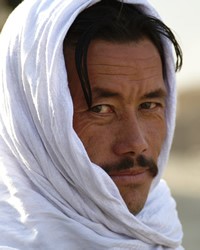Hazara in Indonesia

Photo Source:
Anonymous
|
Send Joshua Project a map of this people group.
|
| People Name: | Hazara |
| Country: | Indonesia |
| 10/40 Window: | Yes |
| Population: | 6,700 |
| World Population: | 4,775,700 |
| Primary Language: | Hazaragi |
| Primary Religion: | Islam |
| Christian Adherents: | 0.53 % |
| Evangelicals: | 0.53 % |
| Scripture: | New Testament |
| Ministry Resources: | Yes |
| Jesus Film: | Yes |
| Audio Recordings: | Yes |
| People Cluster: | Persian |
| Affinity Bloc: | Persian-Median |
| Progress Level: |
|
Introduction / History
The Hazaras are a Persian people living primarily in Afghanistan with significant populations also in Iran and Pakistan. They were the largest Afghan ethnic group prior to 1893, when over half of them were massacred and they lost their political autonomy. Since then, the Hazaras have been persecuted by militant governments, including the Taliban. This has caused some to flee Afghanistan for nearby Iran and Pakistan, with smaller populations in six other countries including Indonesia. The Hazaras in Indonesia live in Puncak, a town in western Java Island.
Their unwritten dialect, Hazaragi, contains regional languages—Arabic, Urdu, Mongol, Turkish and Dari/Farsi, which is now Afghanistan's primary language. The Hazara are the only speakers of Hazaragi.
What Are Their Lives Like?
Hazara refugees have been stuck in Indonesia for many years with little access to education, employment or health care. Indonesia is not a signatory to the UN refugee convention, so Hazaras have no rights there. Hazaras who protest in Indonesia have reportedly been beaten by the police.
Hazaras are trying to either re-settle in Indonesia or use that country as a springboard to Australia, Malaysia or Singapore. A smaller number have married local Indonesians and started new lives in that country. Since Indonesia's economy is weak, very few foreigners can settle there. Some Hazaras in Indonesia have committed suicide.
What Are Their Beliefs?
The Hazaras embrace the Shia branch of Islam. Only about 15 percent of the world's Muslims are Shia; most of the rest are Sunni. Sunni and Shia Muslims share core beliefs, including the five pillars of Islam.
Shia practices tend toward the ecstatic. They affirm human free will, and they differ with the Sunni Muslims in matters of law and ceremony. Unlike the Sunnis, Shias believe that Mohammad's successor should be someone in his bloodline, namely Ali. Because some of their leaders have faced violent martyr's deaths, Shias understand that a righteous man can be killed by the unrighteous. For this reason, they may accept Christ's death on a Roman cross more readily than Sunnis would.
What Are Their Needs?
The Hazara people in Indonesia need the opportunity to start new lives, whether in Indonesia or through emigration to another country. They also need the chance for a new spiritual start.
Prayer Points
Thank God for the Christian resources available in the Hazaragi language. Pray for completion of the New Testament translation.
Pray for loving gospel workers to catch a vision for reaching the Hazara people for Jesus and that in God's sovereign timing the hearts of these people would be open and ready to follow him.
Ask God to have mercy on the Hazara in Indonesia by providing opportunities for a livelihood.
Pray for Jesus movements to bless extended families so the gospel will spread rapidly among the Hazara in Indonesia and will continue to spread to Hazara in other countries.